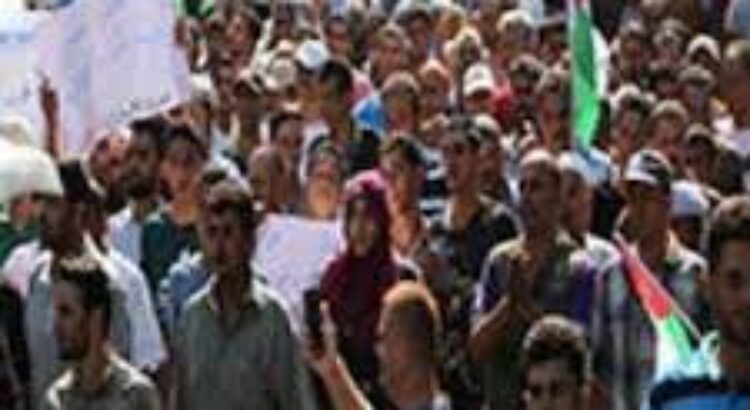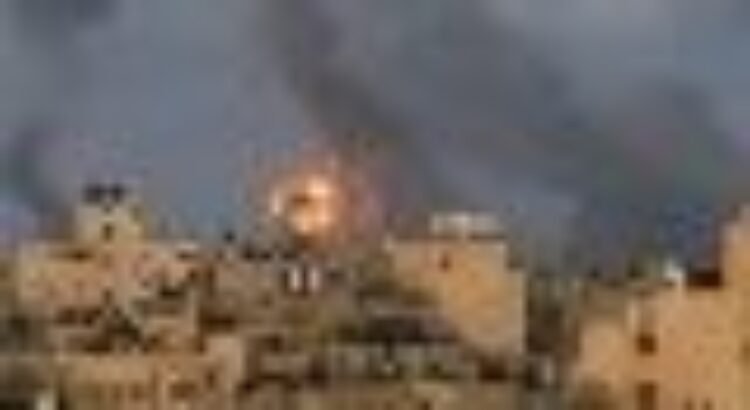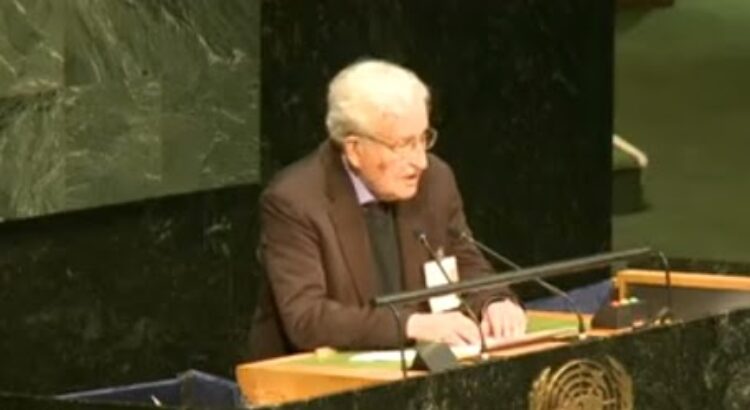Muchos de los problemas del mundo son tan insolubles que es difícil pensar en formas incluso de tomar medidas para mitigarlos. El conflicto entre Israel y Palestina no es uno de ellos. Por el contrario, las líneas generales de una solución diplomática han sido claras durante al menos 40 años. No es el final del camino, nunca nada lo es, sino un importante paso adelante. Y los obstáculos para una resolución también son bastante claros.
Los lineamientos básicos se presentaron aquí en una resolución presentada al Consejo de Seguridad de la ONU en enero de 1976. Se pidió un acuerdo de dos estados en la frontera reconocida internacionalmente —y ahora estoy citando— ”con garantías de los derechos de ambos estados a existen en paz y seguridad dentro de fronteras seguras y reconocidas «. La resolución fue presentada por los tres principales estados árabes: Egipto, Jordania, Siria, a veces llamados los «estados de confrontación». Israel se negó a asistir a la sesión. La resolución fue vetada por Estados Unidos. Un veto de EE. UU. suele ser un veto doble: el veto, la resolución no se implementa y el evento se veta de la historia, por lo que hay que buscar mucho para encontrar el registro, pero está ahí. Eso ha establecido el patrón que ha continuado desde entonces. El más reciente de EE. UU. El veto fue en febrero de 2011 — ese es el presidente Obama — cuando su administración vetó una resolución que pedía la implementación de la política oficial estadounidense de oposición a la expansión de los asentamientos. Y vale la pena tener en cuenta que la expansión de los asentamientos no es realmente el problema; son los asentamientos, indiscutiblemente ilegales, junto con los proyectos de infraestructura que los sustentan.
Durante mucho tiempo, ha existido un consenso internacional abrumador en apoyo de un arreglo en este sentido. El patrón que se estableció en enero de 1976 continúa hasta el presente. Israel rechaza un arreglo de estos términos y durante muchos años ha estado dedicando amplios recursos para asegurar que no se implemente, con el apoyo incansable y decisivo de los Estados Unidos —militar, económico, diplomático y de hecho ideológico— al establecer cómo se desarrolló el conflicto. es visto e interpretado en los Estados Unidos y dentro de su amplia esfera de influencia.
No hay tiempo aquí para revisar el registro, pero su carácter general se revela al mirar lo que sucedió en Gaza en la última década, llevando adelante una larga historia de crímenes anteriores. El pasado 26 de agosto se alcanzó un alto el fuego entre Israel y la Autoridad Palestina. Y la pregunta en todas nuestras mentes es: ¿Cuáles son las perspectivas para el futuro? Bueno, una forma razonable de intentar responder a esa pregunta es mirar el expediente. Y aquí también hay un patrón definido: se alcanza un alto el fuego; Israel lo ignora y continúa su asalto constante contra Gaza, incluido un asedio continuo, actos intermitentes de violencia, más asentamientos y proyectos de desarrollo, a menudo violencia en Cisjordania; Hamas observa el alto el fuego, como Israel reconoce oficialmente, hasta que alguna escalada israelí provoque una respuesta de Hamas,
El primero de la serie fue el Acuerdo sobre Movimiento y Acceso en noviembre de 2005. Voy a dar una paráfrasis detallada del mismo. Pidió un cruce entre Gaza y Egipto en Rafah para la exportación de bienes y el tránsito de personas, la operación continua de los cruces entre Israel y Gaza para la importación y exportación de bienes y el tránsito de personas, la reducción de los obstáculos al movimiento dentro del territorio. Cisjordania, convoyes de autobuses y camiones entre Cisjordania y Gaza, la construcción de un puerto marítimo en Gaza, la reapertura del aeropuerto de Gaza que Israel había destruido recientemente. Estos son esencialmente los términos de sucesivos altos el fuego, incluido el que se alcanzó hace unas semanas.
El momento del acuerdo de noviembre de 2005 es significativo. Este fue el momento de la retirada de Israel, como se llama, de Gaza: la expulsión de varios miles de colonos israelíes de Gaza. Ahora, esto se describe como un noble esfuerzo por buscar la paz y el desarrollo, pero la realidad es bastante diferente. La realidad fue descrita, muy rápidamente, por el funcionario israelí encargado de negociar e implementar el alto el fuego, Dov Weissglas, íntimo confidente del entonces primer ministro Ariel Sharon. Como explicó a la prensa israelí, el objetivo de la desconexión —lo cito a él— era «congelar el proceso de paz», para «evitar el establecimiento de un estado palestino» y garantizar que la diplomacia «se haya cumplido». eliminado indefinidamente de nuestra agenda «.
La realidad sobre el terreno es descrita por los principales especialistas de Israel en la ocupación: un historiador, el respetado historiador Idith Zertal, el principal corresponsal diplomático de Israel, Akiva Eldar, escribió el libro principal, el trabajo estándar sobre el proyecto de asentamiento, llamado Señores de la tierra., refiriéndose a los colonos. Lo que dicen sobre la desconexión es esto: dicen, “el territorio arruinado” —y para entonces estaba arruinado, en gran parte del motivo de la remoción de los colonos— ”el territorio arruinado no fue liberado ni por un solo día del control militar de Israel, o del precio de la ocupación que los habitantes pagan todos los días. Después de la desconexión, Israel dejó tierra arrasada, servicios devastados y personas sin presente ni futuro. Los asentamientos fueron destruidos en un movimiento poco generoso por parte de un ocupante no ilustrado, que de hecho continúa controlando el territorio y matando y hostigando a sus habitantes por medio de su formidable poder militar ”. Ahora, esa es una descripción precisa de la fuente israelí más respetada.
Los Acuerdos de Oslo, hace 20 años, establecieron que Gaza y Cisjordania son una unidad territorial indivisible, cuya integridad no puede romperse. Durante 20 años, Estados Unidos e Israel se han dedicado a separar Gaza y Cisjordania en violación de los acuerdos que habían aceptado. Y una mirada al mapa explica por qué. Gaza ofrece el único acceso al mundo exterior de Palestina. Si Gaza se separa de Cisjordania, cualquier autonomía que finalmente se pueda otorgar en Cisjordania sería encarcelada: Israel por un lado, un Jordan hostil, aliado de Israel, por el otro, y además, uno de los lentos y La política firme respaldada por Estados Unidos es apoderarse del Valle del Jordán, alrededor de un tercio de Cisjordania, gran parte de la tierra cultivable, que esencialmente aprisionaría al resto aún más fuertemente, si Gaza se separa de Cisjordania.
Bueno, el acuerdo de noviembre de 2005 duró algunas semanas. En enero de 2006 tuvo lugar un acontecimiento muy importante: la primera elección plena y libre en el mundo árabe, cuidadosamente supervisada, reconocida como libre y justa. Tenía un defecto. Salió de la manera incorrecta: Hamas ganó el Parlamento, control del Parlamento. Estados Unidos e Israel no querían eso. Como recordarán, en ese período, el eslogan en boca de todos era «promoción de la democracia». El mayor compromiso de Estados Unidos en el mundo fue la promoción de la democracia. Aquí fue una buena prueba. Democracia: la elección salió mal; Estados Unidos decidió instantáneamente, junto con Israel, castigar a los palestinos por el crimen de votar de manera incorrecta; se instituyó un duro asedio, otros castigos; aumento de la violencia; Estados Unidos inmediatamente comenzó a organizar un golpe militar para derrocar al gobierno inaceptable. Esa es una práctica bastante familiar, no revisaré el registro. La Unión Europea, para su vergüenza y descrédito, estuvo de acuerdo con esto. Hubo una escalada israelí inmediata. Ese fue el final del acuerdo de noviembre, seguido de importantes ataques israelíes.
En 2007, un año después, Hamas cometió un crimen aún mayor que ganar unas elecciones justas: se adelantó al golpe militar planeado y se apoderó de Gaza. Eso se describe en Occidente, en los Estados Unidos, la mayor parte de Occidente, como la toma de Gaza por la fuerza de Hamas, lo cual no es falso, pero se omite algo. La fuerza se estaba adelantando a un golpe militar planeado para derrocar al gobierno electo. Ahora, eso fue un crimen grave. Ya es bastante malo votar de manera incorrecta en unas elecciones libres, pero adelantarse a un golpe militar planeado por Estados Unidos es mucho más serio. El ataque a Gaza aumentó sustancialmente en ese momento, los principales ataques israelíes. Finalmente, en enero de 2008 se alcanzó otro alto el fuego. Los términos eran prácticamente los mismos que los que he citado. Israel rechazó públicamente el alto el fuego, dijo que no lo cumpliría. Hamás observó el alto el fuego,
Ahora, eso continuó hasta el 4 de noviembre de 2008. El 4 de noviembre, que fue el día de las elecciones estadounidenses, las fuerzas israelíes invadieron Gaza y mataron a media docena de militantes de Hamas. Eso llevó a que los cohetes Qassam atacaran a Israel, una gran respuesta israelí, muchos asesinatos, todos palestinos, como de costumbre. A fines de diciembre, un par de semanas después, Hamas se ofreció a renovar el alto el fuego. El gabinete israelí lo consideró y lo rechazó. Este fue un gabinete moderado, dirigido por Ehud Olmert, lo rechazó y decidió lanzar la próxima gran operación militar.
Eso fue Plomo Fundido, que fue una operación horrible, tanto que provocó una reacción internacional muy sustancial, investigaciones de una comisión de Naciones Unidas, Amnistía Internacional, Human Rights Watch. En medio del asalto, el asalto, dicho sea de paso, fue cuidadosamente programado para terminar inmediatamente antes de la toma de posesión del presidente Obama. Ya había sido elegido, pero aún no había asumido el cargo, por lo que cuando se le pidió que comentara sobre las atrocidades en curso, respondió diciendo que no podía hacerlo, que Estados Unidos solo tiene un presidente y que no estaba este presidente todavía. Hablaba de muchas otras cosas, pero no de esto. El ataque estaba programado para terminar inmediatamente antes de la inauguración, por lo que podría responder a las preguntas diciendo: “Bueno, ahora no es el momento de mirar al pasado, miremos hacia el futuro. Los diplomáticos saben muy bien que ese es un eslogan estándar para quienes están involucrados en delitos graves: «Olvidémonos del pasado, miremos hacia un futuro glorioso». Bueno, eso fue justo en medio del asalto.
El Consejo de Seguridad aprobó una resolución —por unanimidad, con la abstención de Estados Unidos— pidiendo un alto el fuego inmediato con los términos habituales. Eso fue el 8 de enero de 2009. Nunca se observó, y se rompió por completo con el siguiente episodio importante de «cortar el césped» en noviembre de 2012. Ahora, puede tener una buena idea de lo que estaba sucediendo mirando a la víctima. cifras para el año 2012. Murieron 79 personas, 78 de ellas palestinas, la historia habitual.
Después del asalto de noviembre, se alcanzó un alto el fuego con los términos habituales. Describiré lo que sucedió a continuación citando a un destacado especialista, Nathan Thrall. Es un analista líder en Medio Oriente para International Crisis Group. Mientras escribe, Israel reconoció que Hamas estaba observando los términos del alto el fuego, y «por lo tanto, vio pocos incentivos» para hacer lo mismo. Los ataques militares contra Gaza aumentaron, junto con restricciones más estrictas a las importaciones. Se bloquearon las exportaciones. Los permisos de salida fueron bloqueados.
Eso continuó hasta abril de 2014, cuando los palestinos cometieron otro crimen: Hamas con sede en Gaza y la Autoridad Palestina con sede en Cisjordania firmaron un acuerdo de unidad. Israel se enfureció, enfureció aún más cuando el mundo lo apoyó principalmente. Incluso Estados Unidos dio un apoyo débil, pero real. Varias razones de la reacción israelí. Una es que la unidad entre Gaza y Cisjordania, entre los dos movimientos, amenazaría las políticas de larga data de separar los dos, por las razones que mencioné. Otra razón fue que un gobierno de unidad socava uno de los pretextos de la negativa de Israel a participar seriamente en las negociaciones, a saber, ¿cómo podemos negociar con una entidad que está internamente dividida? Bueno, si están unificados, ese pretexto desaparece. Israel se enfureció. Lanzó importantes ataques contra los palestinos en Cisjordania, apuntando principalmente a Hamas. Cientos de personas arrestadas, en su mayoría miembros de Hamas. También Gaza, también asesinatos.
Había un pretexto, por supuesto. Siempre la hay. El pretexto fue que tres adolescentes, adolescentes israelíes, en los asentamientos habían sido brutalmente asesinados, capturados y asesinados. Israel afirmó oficialmente que pensaba que estaban vivos, por lo que lanzó un asalto de varias semanas en Cisjordania, alegando que estaban tratando de encontrarlos con vida. Mientras tanto, las detenciones, los ataques y así sucesivamente. Resulta que supieron de inmediato que los habían matado. Ahora, también supieron de inmediato que era muy poco probable que Hamas estuviera involucrado. El gobierno dijo que tenía conocimiento seguro de que Hamas lo había hecho, pero sus propios especialistas destacados, como [Shlomi Eldar], habían señalado de inmediato que el asalto, que fue un crimen brutal, muy probablemente fue cometido por miembros de un clan separatista. , el clan Qawasmeh en Hebrón, que no recibió luz verde por parte de Hamas y que había sido una espina en sus costados. Y eso, aparentemente, es cierto, si nos fijamos en los arrestos y castigos posteriores. De todos modos, ese fue un pretexto para este asalto, asesinatos en Gaza también. Eso finalmente provocó una respuesta de Hamas. Luego vino la Operación Margen Protector, la que se acababa de completar, y más brutal y destructiva incluso las que la precedieron.
El patrón es muy claro. Y hasta ahora, al menos, parece continuar. El último alto el fuego se alcanzó el 26 de agosto. Fue seguido de inmediato por la mayor apropiación de tierras de Israel en 30 años, casi mil acres en el área de Gush Etzion cerca de lo que se llama Jerusalén, Gran Jerusalén, aproximadamente cinco veces el tamaño de cualquier cosa que haya sido Jerusalén, tomada por Israel, anexada violación de las órdenes del Consejo de Seguridad. El Departamento de Estado de EE. UU. Informó a la Embajada de Israel que Israel, lo estoy citando ahora, «la actividad israelí en Gush Etzion socava los esfuerzos estadounidenses para proteger a Israel en las Naciones Unidas», e instó a que Israel no debería proporcionar municiones para «aquellos en el [Naciones Unidas] que interpretaría la posición [de Israel] como endurecimiento «. En realidad, esa advertencia se dio hace 47 años, en septiembre de 1967, en el momento de la primera colonización de Israel, la colonización ilegal, de Gush Etzion. El historiador israelí Gershom Gorenberg nos lo recordó recientemente. Poco ha cambiado desde entonces, en los últimos 47 años, aparte de la escala de los crímenes, que continúan, sin interrupción, con el apoyo constante de Estados Unidos.



















 Users Today : 13
Users Today : 13 Total Users : 35460396
Total Users : 35460396 Views Today : 26
Views Today : 26 Total views : 3419189
Total views : 3419189